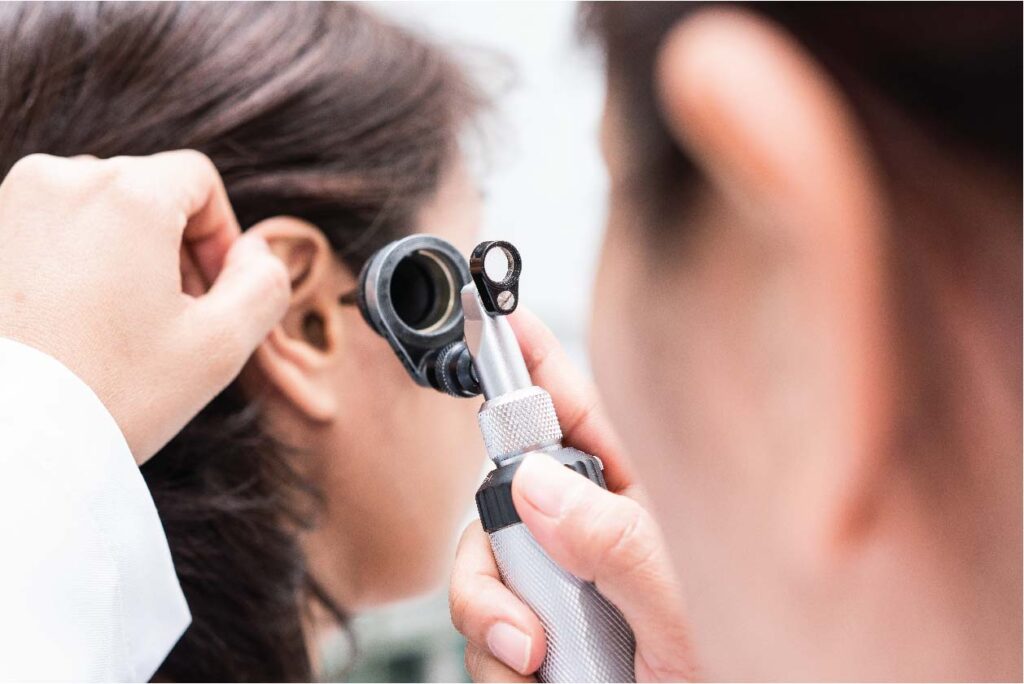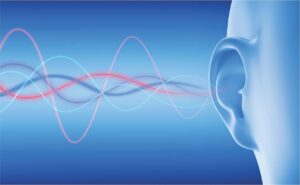When Ears Feel Plugged: Causes and Remedies

Does it drive you crazy when you feel like your ear is plugged? Whether you are flying on an airplane or getting over a head cold, it’s possible that the middle section of your ear is causing symptoms. The Eustachian tube is located in this part of the ear, and it plays an important role in equalizing pressure.
Typically, a yawn, swallow, or sneeze is enough to open the Eustachian tube, which prevents fluid and air pressure from building up. When this tube becomes blocked, then you will feel a sensation of the ear being plugged.
Sometimes, a plugged ear is a standalone symptom that resolves with a little bit of time. For example, your ear might equalize when the plane lands. If this symptom is connected with other symptoms, such as a runny nose, congestion, and coughing, then it’s likely that you need to get over the head cold before your ear will clear up again.
Why Does Your Ear Feel Plugged?
Even though the symptom of having your ear plugged is focused mostly on your ear, the truth is that ear congestion can also be related to your nose, sinuses, or throat. If you want relief from the feeling that your ear is plugged, then you need to address the underlying cause.
Here are a few of the most common causes of pressure in the ears:
- Altitude Change: When you drive up a mountain or take off in an airplane, the Eustachian tubes might be slow in responding to the sudden change in pressure. It takes a moment for the ears to adapt. This same sensation can happen when going under pressure while scuba diving.
- Sinus Infection: Inflammation in the sinuses can increase drainage and congestion. As a result, some of this drainage moves into the ears. Too much congestion can cause the ears to feel blocked.
- Head Cold: Another common reason for increased congestion. The runny nose can drain into the ear, causing issues with the Eustachian tubes.
- Allergies: When your allergic reaction causes an itchy nose, watery eyes, and congestion, then you might have ear problems as a secondary condition to the allergies. Like with colds, the mucus buildup can affect the Eustachian tubes and lead to pressure in the ear.
- Ear Infection: An infection in the middle ear can be another reason why the ear feels plugged. If the infection is preventing the ear from draining properly, then the fluid buildup can cause inflammation and irritation.
- Ear Wax: It’s normal to have a bit of earwax, which is the body’s way to cleanse the ear canal. But a buildup of too much wax can cause a blockage, resulting in ear pressure.
- Object: If there is a foreign object in the ear, it can cause the buildup of pain and pressure. This cause is most common in young children, who sometimes put small items in their noses, ears, and mouth.
- Disease: Certain diseases can cause plugged ears, such as Meniere’s disease, a tumor, cholesteatoma, TMJ, and more.
Remedies for Ear Pressure
Choosing the right treatment for ear pressure depends on the underlying condition that resulted in the symptoms. Here are a few treatment options you might try:
- Altitude: If your ears are affected by altitude changes, try swallowing or yawning to equalize pressure in the ears. Some people find it helpful to chew on gum when the pressure is changing. Another option is to use decongestants to reduce fluid buildup in the ears.
- Earwax: Too much earwax can be removed by using hydrogen peroxide or mineral oil. Soak the ear to break up the earwax, then it can be gently flushed. Never use special tools to remove earwax by yourself. These manual methods should only be completed by an experienced doctor.
- Congestion: It doesn’t matter if your sinus congestion is caused by a head cold, flu, or sinus infection – the treatments are often the same. Reduce the congestion by using a decongestant medication. Some people find it helpful to use nasal sprays or nasal irrigation to open the sinuses and reduce congestion.
- Allergies: Decongestants can also be used for allergy treatment, as well as OTC antihistamines. Sometimes, corticosteroids can be helpful to reduce allergy symptoms.
- Infection: There are times when prescription medications are needed to clear ear infections. The doctor will determine whether the infection is caused by bacteria or a fungus, then either antibiotics or antifungal medications can be prescribed. Antibiotics come in the form of oral medication, or there are also ear drops that can be used in the ears.
- Foreign Object: If you can see the object, then you might be able to gently remove it using tweezers. Don’t force the item if it is stuck, because it could potentially result in additional damage. Another option is to try washing it out with a small syringe. Sometimes, it’s best to talk to a doctor for help with the removal of something in the ears.
As with any other health concern, it’s always best to consult with a doctor if the symptoms persist or are getting worse.
Hearing Treatments and Help
Keep in mind that sometimes the blocked ear causes a temporary loss of hearing. You might notice that everything sounds a little muffled, or you find it difficult to understand what other people say when they are speaking.
Whenever there is a problem with the ear that could affect the hearing, it’s always best to consult with a hearing specialist about your concerns. Simple solutions, such as clearing excess ear wax, can resolve the issue quickly. But more serious causes of ear problems need to be addressed by a hearing expert as soon as possible to prevent long-term, irreversible damage to the ears.
If you need support with your hearing, then our experienced team is here to provide assistance. At Fairfax Hearing Center, we are committed to providing our patients with top-notch services to optimize their ear health and improve hearing whenever possible. Contact us if you need to book an appointment to talk to a hearing specialist.

